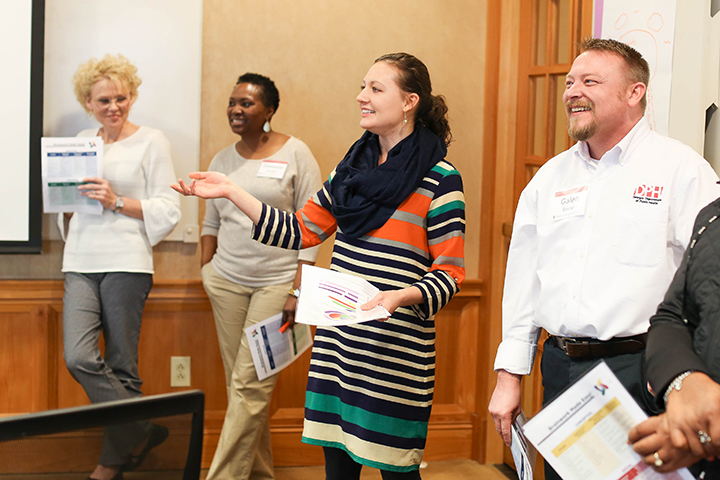The Athens Community Council on Aging (ACCA) is a repository for services geared to help older adults and their families with issues like health and wellness, hunger and transportation. The building on Hoyt Street that houses the council sees a steady stream of partners that have been cultivated from nonprofit organizations, state agencies and the University of Georgia.
It can be difficult to manage groups with such a wide variety of interests and accompanying viewpoints.
As a participant in UGA’s Public Health Leadership Academy, ACCA director of operations Erin Beasley developed tools to help her more skillfully balance the role of each outside group so they can be better partners.
“The range of partnerships you manage in the public health sphere is so broad, to accomplish anything everyone has to come together and work towards common goals,” Beasley says. “That can sometimes pose a challenge.”
“The academy provided concrete tools I can apply each and every day at my job, both in managing our staff and our partnerships.”
The University of Georgia J.W. Fanning Institute for Leadership Development and College of Public Health, with financial support from Georgia Power, created the Public Health Leadership Academy (PHLA) in 2015.
Twenty-two health professionals from across the state graduated from the 2018 program on Oct. 17.
By developing leaders focused on collaboration and transcending boundaries, the leadership academy aims to improve health outcomes in communities across the state.
“Today’s health challenges are influenced by many factors, from our access to educational and economic opportunities to our access of healthy foods and health care,” says Marsha Davis, associate dean for outreach and engagement in the College of Public Health. “We need to support leaders from all sectors that have an influence on health, to create collaborative solutions that address inequalities and to transform communities where health is not determined by zip code, income or ethnicity.”
During the nine-month program, participants not only heard from public health experts on trends in the field and networked with their peers, they focused on understanding their own individual leadership styles and developing collaborative leadership skills.
“Collaborative leaders understand group dynamics and process, help people reach consensus, successfully manage conflict, build trust and understand the need to be flexible to react as circumstances among the group change or new opportunities emerge,” says Carolina Darbisi, a faculty member at the Fanning Institute, who designed the academy’s curriculum alongside fellow Fanning faculty member Louise Hill.
“These skills empower them to bring people from across spectrums together to solve complex problems.”
Groups often overlook the importance of collaborative leadership, Hill said.
“When groups come together around a project or task, they often focus solely on the work set before them,” Hill says. “Collaborative leadership development recognizes that understanding yourself and understanding how to build foundational relationships among the group is a key first step for any group to successfully complete the task at hand.”
For Beasley, learning new skills for managing conflict and fostering difficult conversations was particularly impactful, she said.
“Putting these skills into practice gives me a more complete view of situations, both within my agency and among our partners,” she says. “It builds trust and removes conflict as a barrier, allowing me to focus on building coalitions and moving everyone towards our common goal to ensure our community is living and aging well.”
The College of Public Health is currently accepting applications for the 2019 Public Health Leadership Academy, which starts in February.
Original news release can be found at UGA PSO News.
– Charlie Bauder
Posted on November 5, 2018.







